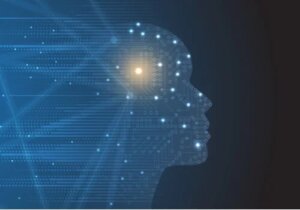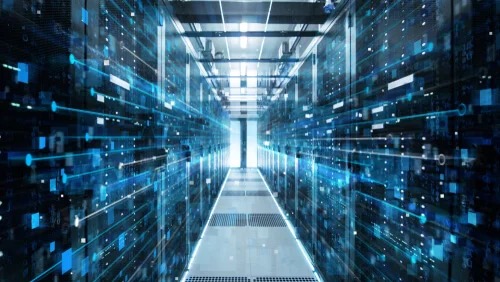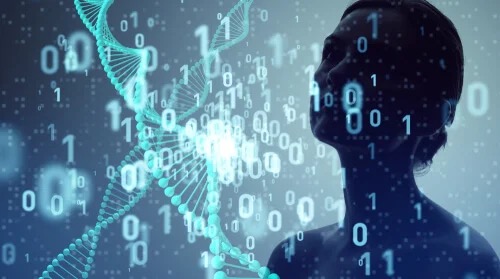Dataism: Is it the Religion of the Future?

Beliefs change over time. After all, it’d be pretty pointless now to be thinking the same things people did 1,000 years ago. Just as, in hundreds of years, people will forget what we think now. Nevertheless, let’s delve into possible future beliefs for a moment and take a look at dataism.
In fact, the belief in the power of data could well be the new religion of the future. Indeed, although most of the principal religions of today originated in the Middle East, it seems that this particular nerve center could well end up moving to Silicon Valley. After all, who could say for sure that religions of the future won’t end up coming from Northern California?

Dataism
Dataism suggests that the universe consists of data flow. Furthermore, that humans are organisms with biochemical algorithms, while machines have electronic algorithms. Both are considered to be algorithms, so the differences between the two would be minimal. In fact, the value of any phenomenon or entity would be determined by its contribution to the processing of any data.
Therefore, dataism argues that the same mathematical laws apply to both biochemical and electronic algorithms. Consequently, dataism removes the barrier between machines and animals. Furthermore, it predicts that electronic algorithms will eventually decipher and surpass biochemical algorithms.
The development of dataism
In 2014, South Korean philosopher Byung-Chul Han stated that intuition is merely subjective so big data will end up making it useless. According to this author, theories are suspected of being ideologies, and when enough data is available, they become superfluous. Hence, dataism would be the future, where they’ll renounce feelings in favor of data.
In 2016, Yuval Noah Harari placed dataism in context in his book, Homo Deus. He stated that the universe is a stream of data and humans have the ability to process it. This way of understanding the world sees the history of humanity as being a continual search for improving the efficiency of systems. More specifically, data processing systems. Thus, human beings would’ve improved connections and freedom of movement of data.
“The most interesting emerging religion is Dataism, which venerates neither gods nor man – it worships data.”
-Yuval Noah Harari-
Dataism as religion
Capitalism emerged as a scientific theory and ended up dominating the world. In fact, it’s actually become a religion. Similarly, dataism emerged as a theory. However, it’s getting closer and closer to determining what’s right and what’s wrong.
When algorithms get to know people better than they know themselves, they can tell them what to do. Can you imagine an algorithm telling you who you should marry?
It certainly seems that this data processing system will be like a God. It’ll be everywhere, and it’ll know everything. Furthermore, humans will be destined to merge with it. In fact, you might call it the revolution of the unnecessary class.
Humans will choose to merge with machines. Those who don’t will be treated like animals. Therefore, dataism will become a religion based on the premise that freedom of information is the greatest good of all.
Martyrs and prophets
All religions have prophets who convey their beliefs and martyrs who die in their defense. Dataism is no different. Arron Swartz is a martyr. He was a hacktivist who was known for downloading articles from academic journals and releasing them so everyone could access them. In fact, he released no less than 4.8 million articles. These actions led to his arrest. However, he ended up committing suicide rather than face a possible life sentence in prison.
Religions need prophets too. These people transmit the wisdom of their religion to others. In this instance, dataism has Raymond Kurzweil. He’s an engineer who works for Google. He claims that humanity is heading towards transhumanism. In other words, the improvement of humans via the development and manufacture of technology. Furthermore, he preaches and predicts the future merging of humans and machines.

The role of humans
What role would humans play in this new religion? In fact, humans would be chips. Chips that process the data. For this reason, cities with the largest number of inhabitants would have the greatest processing capacity. Similarly, the variety of different types of processors would increase processing capacity.
As a result, using different chips or people would increase dynamism and creativity. However, increasing the number and variety of processors wouldn’t make sense if they weren’t connected. Consequently, commercial networks would expand between cities so freedom of movement would be greater.
However, it’s difficult, if not impossible, to predict the future. Although it certainly appears that dataism would be quite viable. As a matter of fact, belief in the power of data and fusion between machines and humans is a real possibility for the future. This type of situation would give decision-making power to algorithms. In addition, it would reduce the margin of error. Nevertheless, certain problems would remain. One example would be the interpretation of human consciousness. Indeed, no algorithm to date has managed to decipher this particular phenomenon.
All cited sources were thoroughly reviewed by our team to ensure their quality, reliability, currency, and validity. The bibliography of this article was considered reliable and of academic or scientific accuracy.
- Harari, Y. N. (2016). Homo deus: Breve historia del mañana. Madrid: Debate.
This text is provided for informational purposes only and does not replace consultation with a professional. If in doubt, consult your specialist.








